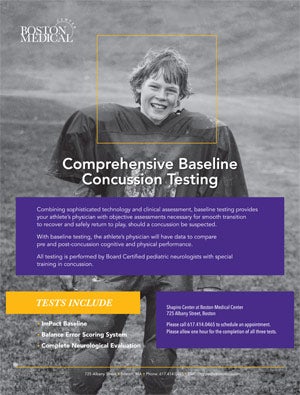A concussion is a type of traumatic brain injury, or TBI, caused by a bump, blow, or jolt to the head that can change the way your brain normally works. Concussions can also occur from a blow to the body that causes the head to move rapidly back and forth. They can occur in any sport or recreational activity and most occur without loss of consciousness. Most people with a concussion will recover quickly and fully, but for some, signs and symptoms of concussion can last for days, weeks, or longer.
Causes
The brain is an organ surrounded by fluid that floats inside the skull. The fluid acts as a shock absorber for minor impacts, but when the brain moves rapidly inside the skull, a concussion has technically occurred. In sports for instance, when a player is tackled and suffers whiplash, the hit causes the head to move faster and the brain to strike the inner skull wall. When the whiplash stops, the brain can also hit the opposite wall of the skull.
Signs and Symptoms
The effects of a concussion may clear up quickly for those injured, but when they don’t, symptoms appear and usually fall into four categories:
Cognitive
- Difficulty thinking clearly
- Feeling slowed down
- Difficulty concentrating
- Difficulty remembering new information
Emotional/Mood
- Irritability
- Sadness
- More emotional
- Nervousness or anxiety
Physical
- Headache
- Fuzzy or blurry vision
- Nausea or vomiting (early on)
- Dizziness
- Sensitivity to light or sound
- Balance problems
Sleep
- Sleeping more than usual
Some of these symptoms may appear right away, while others may not be noticed for days or months after the injury, or until the person starts resuming their everyday life and more demands are placed upon them. Sometimes, people do not recognize or admit that they are having problems. Others may not understand why they are having problems and what their problems really are, which can make them nervous and upset.
The signs and symptoms of a concussion can be difficult to sort out. Early on, problems may be missed by the person with the concussion, family members, or doctors. People may appear healthy, even though they are acting or feeling differently.
Danger Signs in Children
Take your child to the emergency department right away if they received a bump, blow, or jolt to the head or body, and demonstrate any of the following symptoms:
- Headache that gets worse and does not go away
- Weakness, numbness or decreased coordination
- Repeated vomiting or nausea
- Slurred speech
- Look very drowsy or cannot be awakened
- One pupil (the black part in the middle of the eye) larger than the other
- Convulsions or seizures
- Cannot recognize people or places
- Increased confusion, restlessness, or agitation
- Unusual behavior
- Loss of consciousness (a brief loss of consciousness should be taken seriously and the person should be carefully monitored)
- Will not stop crying and cannot be consoled
- Will not nurse or eat
Testing and Diagnosis
SCAT5
The Sport Concussion Assessment Tool (SCAT5), developed by a group of international experts, (Berlin 2016) is used to evaluate injured athletes for concussion. If an athlete completes the test prior to their season, baseline results can be established to determine a patient’s normal responses or reactions. Then, if he or she suffers a concussion the test can be taken again and results compared to evaluate when it is safe to return to play.
The SCAT5 is made up of many different parts and measures immediate memory, concentration, delayed recall, balance, and orientation. Result scores are understood nationwide.
King Devick
The King-Devick Test is a quick, objective, remove-from-play sideline concussion screening test that can be administered by parents, coaches and medical professionals. This test can be administered on an iPad or Android tablet and is a valuable tool to aid in the detection of concussions.
ImPACT
A 25 minute computerized test called ImPACT (Immediate Post-Concussion Assessment and Cognitive Testing) is used to obtain baseline evaluations of neurocognitive functioning (memory, thinking, concentration, and reaction time) is an aid to determine safe return to play decisions for athletes. Baseline tests are recommended every two years and can be used in comparison to a repeat ImPACT test if a concussion is suspected to evaluate potential changes or damage caused. The test is available in more than 20 languages.
ImPACT Features:
- Measures player symptoms
- Measures verbal and visual memory, processing speed, reaction time, attention span, non-verbal problem solving, and response variability
- Reaction time measured to a 1/100th of second
- Assists clinicians and athletic trainers in making difficult return-to-play decisions
- Provides reliable baseline test information
- Produces a comprehensive report of test results
- Automatically stores data from repeat testing
- Testing is administered online for individuals or groups
Baseline Concussion Screening for Teen Athletes
Departments and Programs Who Treat This Condition
Concussion Clinic for Children
Concussion and Traumatic Brain Injury
Neurology
Pediatric Sports Medicine Clinic
Physical and Occupational Therapy
Physical Therapy
 en
en 

 Français
Français Deutsch
Deutsch Italiano
Italiano Español
Español Tiếng Việt
Tiếng Việt Kreyol ayisyen
Kreyol ayisyen